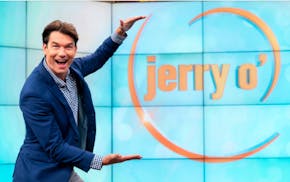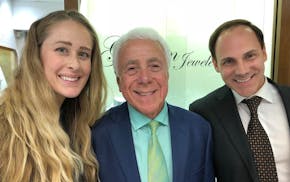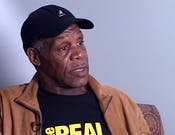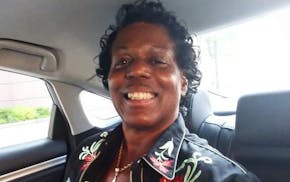Mel Gibson probably doesn't have many friends like his "Lethal Weapon" franchise co-star Danny Glover.
Glover and I were getting along just fine until I pressed to discern the limits of his friendship with Gibson.
An activist as well as an actor, Glover was in St. Paul to support his friend and "Buffalo Soldiers" castmate Jeri Brunoe in "Salmon Woman." The performance at the Ordway was a benefit for the American Indian Prison Project Working Group.
"Actually 'Salmon Woman' was a project Jeri brought my company," said Glover. "Sometimes you do a movie and you are introduced to another community. It's not that you're unaware of that community; it's that you have another level on which you engage with that community. For me it was great because my grandmother is part Choctaw, so indirectly that is a community that was accessible to me."
Such a supporter is Glover that he turned over his honorarium for his appearance to AIPPWG.
Also clearly a longtime staunch supporter of Gibson's, Glover says he loves the man whom many in Hollywood have turned away from as a result of a series of controversies involving his hyperactive mouth.
Too many celebrities who live their lives among yes people would benefit from a friend telling them the naked truth. Friends are the people whose criticism means the most in a world where any knucklehead with a computer or phone can tell you what they think.
But Glover gruffly interrupted me making that point, as you can see on my startribune.com/video.
After the interview, Glover said, "What Mel and I say to each other is my private life, and I'm not writing a book."
Saying that on camera would have been a better use of our interview time.
I also worked in a joke about our dust-up while discussing Glover's mother's alma mater, Payne College in Augusta, Ga., where he said he created a scholarship in her name.
"I thought you said you were one of the few people who knew what pain is," said Glover, joking, I think. "Where Payne College is, OK."
Teasingly, I told Glover that I knew what pain was because he'd verbally abused me in the last few minutes.
That brought a hearty guffaw and a "Give me a hug," followed by screaming laughter.
This version of the interview opens with the question about Gibson that preceded the ones that got under Glover's collar — the collar I helped smooth into place because he wanted to "look good."
Q: Have you ever had a better toilet bomb buddy than Mel Gibson?
A: My whole relationship with Mel was just fantastic. Think about how things come about and if you look at your career every step of the way. If [indecipherable name] had not seen me in " Places in the Heart," opening on Broadway, would I have ever gotten to do anything I've done? If I hadn't taken a chance in 1979, hearing about an off-Broadway play in a rinky — not the best place you want to make your auspicious New York debut — called the Roundabout where [indecipherable] walks into rehearsal; a run-through one Sunday afternoon, watches me, introduces himself and then in January 1982 calls me while I'm trying to make things happen … all the choices that you make. You can't go back and say, "If I had done this different then this would have happened." You go back and see what you did that provided an opportunity in another place. Had not [casting director] Marion Dougherty seen me and Carl Lumbly [Minneapolis native, South High and Macalester grad] in a play at the Matrix Theater in 1978, when we were performing three performances, would she have hired me for "Escape from Alcatraz," a role in which I'm not even noticed in the film. After "The Color Purple," when Warner Bros. is doing this big action film, she's the head of casting and she's asked, "Who do you want for Riggs?" "What about Mel Gibson?" "Who do you want to [play] Murtaugh?" "What about Danny Glover?" And [director] Richard Donner said, "But he's black." She looks him straight in the eye: "So what, he's black?" Who knows? All those things happen in a way. My only control on it was I was passionate about what I was doing. I did enough and found ways to believe in the course. Not to know the outcome but to continue to grow in it. It was a part of me. Who would have known in 1967 when I picked up a book of a man's writings who had been in jail that I would become so moved by his words, his language at 20 years old that I would end up playing him in 1986, Nelson Mandela. Who knows that?
Q: Do you have the kind of friendship with Mel Gibson that allows you to tell him when his behavior has been out of line?
A: I have a friendship with Mel Gibson. It's a respectful friendship, and when I talk to Mel I know what's gone down and heard what is happening. I don't know how [indecipherable] true but I would think my relationship is deeper than that. It's the kind of relationship and I'll say this: As I've said when people try to get me to throw … say something bad … I love Mel Gibson. That's all I have to say about that. [But I pressed.] I don't want to go any further with the question. You can say, "Danny Glover says he loves Mel Gibson." [I pressed.] This is not an interview with you. This is [an] interview with me. What your friend says is relevant to your friends; what's relevant to me is that I love Mel Gibson. Do you have another question? [And I pressed.] I talked to Mel, I mentioned that before. I called Mel on his birthday Jan. 3 and wished him happy birthday. What's your next question?
Q: You're not married right now?
A: I'm married to a wonderful woman who's a professor of education from Sao Paulo, Brazil, and we've been married over six years.
Q: Reading up on you I'm surprised you became an actor instead of an activist.
A: I'd like to put that another way. I've always felt myself beyond anything else a citizen, from the earliest in my life; protesting against the death penalty when I was 17, 18, and the execution of Caryl Chessman in California. So just since I'm an unapologetic child of the civil rights movement, I've always felt the idea of service trumped everything. Especially born at a point in time, when people put their life on the line for change, inspired me. At one point I thought I was going to be an engineer. Then I studied economics because I read African socialism. I began my real work in city government in 1971, I worked for the Model Cities Program in the office of community development in San Francisco under Mayor Joseph Alioto.
Q: The plight of Native American men is very worrisome to you?
A: The statistics are appalling when it comes to Native American men, what happens to them. Often what we don't know is their lives are hidden from our radar. Most who go through daily life don't know what happens on a reservation, don't know the history of what happens on a reservation to women, children, men; daughters and sons are in constant danger. These people were the first ones living here [he smiles, then covers his face with his hands]. Now here they are in a position where their lives have been endangered and threatened.
Q: You think Native American men have it tougher than black men in America?
A: You can't look at apples and oranges. I try not to do that because the African-American experience is unique. Perhaps if they had been able to enslave Native Americans, we'd have a different scenario, a different narrative. They just obliterated them, they just massacred them, killed them out … so I don't know. We can put them now in the same boat. We're all in the same boat.
Q: Is President Obama still disappointing you?
A: Did I say I was disappointed? What disappoints me is that we haven't done the things we need to do to make him move. That's what disappoints me. We need to do the things as citizens to challenge what is happening. I don't care if it's Afghanistan, public policy. We have to do the things.
Q: When the end of a life occurs like Robin Williams' did, does that make you take stock of yourself?
A: I don't want to be dismissive of what has happened with Robin Williams' passing. I think my life is always under some sort of constant evaluation. What am I doing? What are the choices I make? What do I say? How will I understand the world around me; connecting with me right now? What is happening in Ferguson, Mo.? Or what is happening by reading the work of Michelle Alexander, "The New Jim Crow," and all gives me further clarity. I am a person engaged in civic action as a necessity, as part of my calling as a human being … all of those things are the texture of your life, as we say, "We're dust in the wind," you know. Who we are and the time we spend here is the manifestation of what our lives or what the possibilities can be. The art of activism, feeling that you're involved in something, a dynamic process of dialogue, keeps me grounded.
Q: What black actor are you most often mistaken for by fans?
A: It depends … [laughter] on the state of their eyesight. Basically, some people don't see well. They confuse me at any moment with Morgan Freeman [laughter], ah, Sidney Poitier [laughter] or Denzel Washington [laughter]. I remember sitting at lunch with my daughter years ago in New York and these three [black women] swore up and down that I was Sam Jackson. My daughter couldn't believe it: You don't look like Sam Jackson! I was in South Carolina, going up the coast, I came to get some gas and a woman up there…. [said] Wooooh! Sam Jackson! A black woman. I'm not Sam Jackson. Oh, you are Sam Jackson. I said, "Look here. I've got hair, and it's very little, but Sam does not have any hair." And she said, Well, he's got hair in the movies. That's the beauty of people. I gave her something to mull over and she said, Well, he's got hair in the movies. It's beautiful, baby. I get more, I know you from somewhere? I will say, 'I sang in your church choir,' and they say, Naw, that wasn't it. I like to have fun with it.
Q: What role do you most regret turning down?
A: Not one. And there weren't roles I regret taking at all. The roles I've been offered and I turned down were roles I didn't want to do no matter who else took them, no matter how well the film came out and that's something I don't like to discuss. After I have said, 'I don't want to do,' for whatever ever reason, that's it. The person who takes the role may do a fantastic job. That doesn't mean [laughter] that I wanted to do it or the rationale behind my decision changes.
Q: I hated you as Mister in "The Color Purple."
A: So did my grandmother, OK. Move on now [laughter]. She saw the picture and wanted to get a switch after me. And she actually did every time she saw me after that. She was about 92 years old. Let's see, when did "Color Purple" come out on video? I went to spend Christmas with her, 1987. My grandmother was born in 1892 … 1987 Let me get my numbers right. [Nancy Kelly, an AIPPWG D. C.-based staffer, and I marveled that he is doing math in his head.] She was 92. She came out hopping mad. "That boy knows he was raised better than that." ...... Reecie Mae, Reecie Mae, he was just acting. She lived to be 99. Every time I came on that little farm, she had to hit me with a switch. Reecie Mae, what a woman.
Q: I'm coming to your house for Thanksgiving dinner. What are you going to prepare with your own hands?
A: All the stuff that my mother taught me to prepare, that my dad taught me to prepare. Turkey, dressing, monkey bread, the greens, string beans. You know.
Q: [from Nancy Kelly]: Can I ask a question? Stuffing or dressing?
A: It's dressing. I never heard of the word stuffing. Cornbread dressing, put a little oyster in it, eggs, sage. … The first thing all five of us learned how to do, particularly the first four of us, is to cook … My mother used to always remind my father that "Jimmy, you didn't know how to boil water before you met me." My dad's 7-Up cakes, pound cakes; he's the one who taught me how to make monkey bread. I learned how to make fried chicken watching two people, [plus] my dad, but the two best I've ever seen are my grandmother and my mother. You taste my dad's pecan pie, you wanna slap your grandmamma, you know what I mean?
Interviews are edited. To contact C.J. try cj@startribune.com and to see her watch Fox 9's "Buzz."

C.J.: Jerry O'Connell gets support from Wendy Williams for talk show





